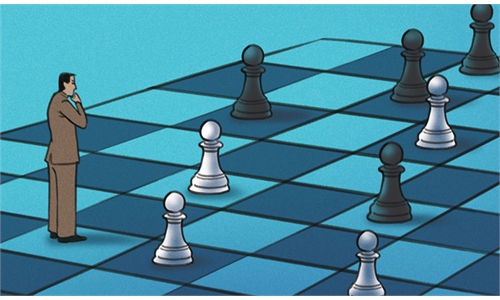
Illustration: Liu Rui/GT
The question of whether Japan could become the sixth eye of the Five Eyes alliance was the focus of Japan's military security agenda in 2020. Japan has provided intelligence to the US and the UK about the Xinjiang Uygur Autonomous Region "showing evidence of China's forceful detainment of Muslim Uyghur minority people," Kyodo News reported in December. The intelligence drew strong criticisms from the US and the UK over China's policy toward ethnic minorities. Some analysts perceive it as an important step for Japan to join the Five Eyes intelligence-sharing alliance.In addition, the Center for Strategic and International Studies, a US-based think tank, recently released its fifth "Armitage-Nye" report, led by former deputy secretary of state Richard Armitage and Joseph Nye, former dean of Harvard University's John F. Kennedy School of Government, titled "The US-Japan Alliance 2020." It suggests that Washington and Tokyo should make serious efforts to move toward a Six Eyes network.
On the issue of intelligence sharing, content is always more important than form. Even if Japan does not publically join the alliance, it is possible to strengthen cooperation with the Five Eyes in actions.
As to whether Japan will formally join the Five Eyes alliance, Japan is strong in will but weak in capability. But it will continue to move closer toward the alliance.
The Japanese government is very eager to join the alliance and obtain intelligence from the Five Eyes countries. It is of significance to improve Japan's international status. Former Japanese defense minister Taro Kono has argued on several occasions that Japan should become the sixth eye. For the Five Eyes countries, Japan is in East Asia, adjacent to China, Russia and North Korea. Due to its geographical advantage, it could get more intelligence concerning these countries. Considering Japan's recent moves to deepen the QUAD, an informal consultative mechanism comprising of the US, Australia, Japan and India, there is no reason for Japan not to join the Five Eyes alliance.
For Japan, the obstacles to its formal entry are mainly domestic. First, Japan does not have a highly specialized intelligence organization like the US' CIA or the UK's MI6. If Japan wants to join the Five Eyes alliance, which Japanese organization should other countries cooperate with?
Second, to break through the barriers to intelligence gathering and sharing, Japan needs to make a breakthrough with its legal process. The Japanese government passed the Act on the Protection of Specially Designated Secrets (SDS Act) in 2013. However, the enactment and promotion of laws such as anti-espionage law still face constitutional hurdles, which are essential for the country to join in the Five Eyes alliance.
Third, questions remain about the extent to which Japan can share intelligence with the other five countries. Japan is not an Anglo-Saxon country. Although its alliance with the US is deeply institutionalized, its integration into multilateral intelligence-security mechanisms is doubtful.
The framework of the Five Eyes alliance is a pyramid structure, with the US at the top. Should Japan join the alliance, it will need to better define its own position and interest. The Japanese government will have to consider this matter very carefully.
Of course, joining the Five Eyes alliance could be a starting point for Japan to promote related reforms. For example, the institutional obstacles for Japan to join the Five Eyes alliance mentioned above may become reasons for Japan to push forward the constitutional amendment.
Japan's overall ability to collect and analyze intelligence is not bad. But intelligence sources are scattered among multinational companies (research institutes under enterprises), media outlets, and even individuals. The Japanese government may not be good at gathering information, but it is good at integrating it.
In this case, Japan may take this opportunity to strengthen the organization of its intelligence services to enhance cooperation with Five Eyes countries.
In general, with regard to the Five Eyes alliance, the preferred option for Japan should be collaboration rather than joining the alliance. This option is also known as the "Five Eyes Plus One."
Such an intelligence-sharing system may be more likely to become a reality.
The author is an associate research fellow at the Center for Japanese Studies, Fudan University. opinion@globaltimes.com.cn

